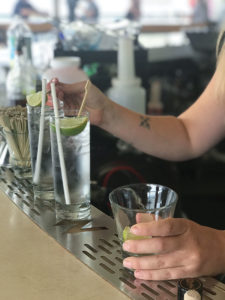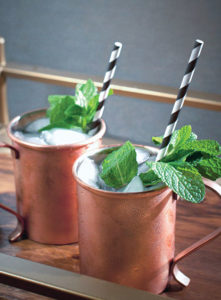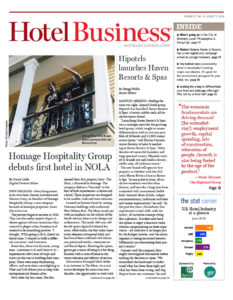INTERNATIONAL REPORT—When you think of the latest and greatest in hotel trends, your mind may go to innovations like voice activation and casting capabilities, or convenience features like mobile check-in. Trends, however, are extending far beyond shiny new technology, and one that seems to be here to stay comes with the goal of not only making hotels great places, but Earth a great place as well. With sustainability practices on the rise, hotels are zeroed in on single-use plastics.
Several brands have implemented or are in the process of implementing practices to limit single-use plastics: Marrott International Inc., Hyatt Hotels Corp., MGM Resorts International, Bahia Principe Hotels & Resorts, Banyan Tree Hotels & Resorts, and AccorHotels, to name a few.
Marriott’s initiative could eliminate the use of more than one billion plastic straws per year and about a quarter-billion stirrers. Plastics will be removed in more than 6,500 properties across 30 brands in 127 countries and territories by July 2019.
For now, Marriott aims to deplete existing inventory (while reserving a subset to accommodate guest needs), identify vendors that can provide alternate products (see sidebar) and educate associates about providing paper or alternate straws upon request, said Denise Naguib, VP of sustainability & supplier diversity at Marriott International.
“This new global standard fits within the goal we set last November to reduce our landfill waste by 45% by 2025. It also addresses the growing concern from a number of guests—especially millennials—who are trying to reduce the use of plastic in their daily lives and are more likely to shift business to companies that share their core values around sustainability,” Naguib said.
Marriott’s Edition is going one step further by implementing changes that not only affect the brand itself, but encourage others to follow suit. Edition’s “Stay Plastic Free” initiative was created with the intention to get other brands on board. So far, Edition has banned plastic straws, switched from plastic water bottles to cans and/or bottles, switched all back-of-house operations to water fountains, and provided each member of staff with a stainless-steel bottle.
“If you consider that just four Edition hotels used over one million plastic water bottles in 2017, you can understand what kind of impact the industry can have on the environment. It’s our responsibility—and the responsibility of the industry as a whole—to utilize our power to make a change,” said Ben Pundole, VP of brand experiences, Edition Hotels.
Hotel companies are making the switch amidst growing concerns about the impact that single-use plastics make on the environment; they’re not easily disposable and can drastically damage marine life.
“Global social pressure and awareness and consciousness of consumer impact are driving businesses to make more thoughtful decisions when purchasing products for the hotels. Sadly, we have seen the impact of our practices over the years and it’s time to take responsibility and make a change,” Pundole said.
For hotels, these practices are not just filtering down as mandatory corporate initiatives, but rather, something that employees and guests alike are passionate about—and even requesting.
The Garland hotel in North Hollywood, CA, has implemented plastic-free programs. The hotel’s restaurant, The Front Yard, has replaced plastic straws with biodegradable ones. These straws will only be given upon request for most beverages.
“We have seen more leisure, corporate and group travelers require us to have a sustainability program as a prerequisite for them to book with us. We also find that many of our guests welcome these efforts and seek to adopt these initiatives in their private lives if they are not already ‘green,’” said Scott Mills, general manager of The Garland.
“A growing number of our corporate customers request extensive reporting about our sustainability efforts and what we’re doing to reduce our environmental impact,” Naguib said. “Ultimately, initiatives like this can help us win business.”
Pundole agreed, noting guests are seeking sustainability practices when choosing brands. “We’re starting to see that consumers are making choices based on impact, whether it be fashion or hotels. They want to know that they’re not creating a negative impact.”
Hyatt is also limiting plastic use. This has been a few years in the making for Hyatt, which launched its 2020 Environmental Sustainability Vision in 2014. For Hyatt, after Sept. 1 of this year, straws and picks will be available upon request only, and eco-friendly alternatives will be provided where available.
“Many of our hotels have already gone straw-free and source eco-friendly alternatives. This change has received a positive response from guests,” said Marié Fukudome, director, environmental affairs, corporate responsibility at Hyatt. “As more companies implement green practices, we’ve seen an increase in customer groups inquiring about our own environmental practices in RFPs.”
Fukudome said that with the many Hyatt properties that have sustainability practices already in place at the property level, they’re willing to take on company-wide initiatives. “Hotels all face different environmental and operational opportunities and challenges, and for many of our environmental initiatives, we set global frameworks and goals, and programs are then developed and executed locally based on needs,” she said.
Sustainability is key for hotels beyond the issue of single-use plastics. Water and energy conservation are always top of mind. For hotels, working with suppliers and other organizations that possess an equally green outlook is significant.
“The hospitality industry has come together to work on a number of sustainability initiatives to tackle global issues,” she said.
Fukudome also mentioned Hyatt’s work with the AHLA, World Wildlife Fund (WWF) and other hotel companies, with support from The Rockefeller Foundation, where Hyatt created and launched a toolkit, developed to advance industry-wide food waste prevention. Edition hotels also supports similar groups. Edition has worked alongside the Lonely Whale Project and Project Zero to preserve the ocean.
Fukudome explained why these collaborations are so important to not only fuel employee involvement but to encourage guests to travel and see the world: “At Hyatt, we strive to operate our business in a way that minimizes environmental impact, and the reward is that we help protect the communities and natural environments that inspire our guests to travel.”
“Hotels can be leaders in sustainable practices. Hotels are dependent upon tourism, which is frequently based on people visiting beautiful environments from beaches, to deserts, to forests, to cities,” said James Crank, managing partner/owner of The Garland. “Once those environments are degraded, the industry will be adversely affected. It’s vital to the health of our industry to be stewards in protecting the resources of the destinations our guests are visiting.” HB
Paper or plastic?
FORT WAYNE, IN—With hotel sustainability initiatives on the rise, single-use plastics are beginning to be a convenience of the past. Paper straws are taking center stage, and Aardvark, The Original Paper Straw, is hearing the industry’s cries for an eco-friendly yet durable alternative. Aardvark, based here, traces its roots back to the first-ever paper straw and offers hotels a selection of them ranging in size and color. They are even customizable.
“As the dangers of single-use, plastic straws continue to be brought to light, more consumers and businesses are understanding the lasting effects of these modern-day conveniences,” said David Rhodes, global business manager for Aardvark. “Now, more than ever, consumers are demanding that brands they interact with care about social responsibility. This is why it’s such an attractive time for hotels to introduce eco-friendly products.”
According to Rhodes, Aardvark straws are made with one-third more material than other paper straws on the market and are manufactured using FDA food-grade-approved ink so they won’t bleed ink or break down into beverages, yet only take 45-90 days to decompose. Aardvark straws are also made with an “eco-flex” design, making them a bendable or “flexy” paper straw.
The Chicago Athletic Association hotel in Chicago is just one of the many hotels that offers Aardvark straws to guests. Michael Mason, its director of restaurant, bars and events, feels plastic-free initiatives align well with hotels’ F&B offerings.
“The concern for our environment is a natural extension from farm-to-table and the use of local products. Plus, knowing our industry can make an impact really hits home,” Mason said, noting he has seen Aardvark straws hold up after being in diet soda for hours.
He also recognizes the power of the hospitality industry. “Since we are encouraging travel, which, in turn, creates pollution, we, as an industry, have the duty to limit the environmental impact as much as possible,” he said.
“The paper straw is just a gateway to promoting overall awareness to eliminate all single-use plastics,” Rhodes said. “Any plastic item that is used for a few minutes or a few days and then discarded should be on the list for replacement to a more sustainable product.” —Abby Elyssa



